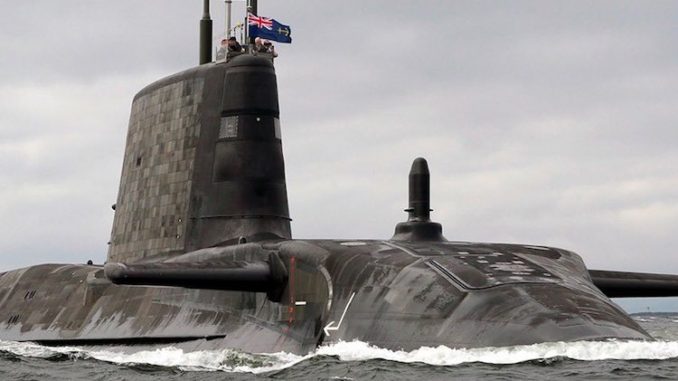
There’s been very little analysis on what the AUKUS announcement means for New Zealand’s defence and for decisions around maritime capability, writes former Opposition Spokesperson for Defence and Veterans Chris Penk MP.*
It’s now been some months since we heard the AUKUS alliance announced, including news of a nuclear-powered submarine fleet for Australia.
Almost all the commentary here focused on the activity of other nations in our region and guesswork as to geopolitical implications even further afield. But while we’ve heard much about the interests of AUKUS partners relative to those of China – and less direct, more hypothetical impacts, such as New Zealand’s trade prospects with France – there’s been relatively little analysis of what it all means for our defence.
In military strategic terms, the change is potentially seismic. The big picture is that New Zealand is a maritime nation dangerously dependent on the state of our surrounding seas. It’s not just our ideals in the Indo/Asia-Pacific region that are at stake but also our national interests. Our territorial waters (out to 12 nautical miles) and Exclusive Economic Zone (out to 200 nautical miles) are the stage on which our national fate will be decided in the rest of this century.
We are surrounded by seas that are variously trade routes, fisheries, areas of maritime search and rescue responsibility and part of the worldwide “freedom of navigation” network. These are also places where piracy, modern slavery, people smuggling and drug running occur, among other unsavoury activities. Out of sight these may all be, but they should be front of mind.
From the perspective of NZ Inc generally – and certainly when it comes to issues of sovereignty – we should be intensely interested in what Australia’s moves underwater mean for our own defence capability.
On the face of it, Australia scaling up its capability is positive for Aotearoa.
Read this article in the digital edition:
I should acknowledge at this point that I am somewhat biased in the matter, having been a submariner in the Australian Navy prior to becoming an MP. In that sense I suppose I declare a conflict of interest. Then again, I’d consider myself unusually well placed – as a policy maker on this side of the Tasman – to understand the implications of that particular “silent service”.
So while most commentators have been focused elsewhere, I sincerely hope that these issues are being worked through in our Ministry of Defence and the NZDF itself. The Minister of Defence should certainly instruct them to do so, if he hasn’t already.
It’s perfectly reasonable that government agencies not share their views on these matters of national security. As an Opposition MP, however, I have a responsibility for ensuring that key concerns are being addressed, so I raise them in any case.
And let’s be clear: there are a number of factors that pose serious challenges for our defence.
First, as the situation currently stands, New Zealand will not be allowing these vessels to visit our shores. That’s literally the law of our land – nuclear-free legislation made under David Lange – even if its prohibition on nuclear propulsion (as distinct from nuclear weapons) is rather quixotic. In the brave new world of AUKUS, however, it is troubling to think that a maritime nation with a relatively modest navy of its own would roll out the unwelcome mat to the key naval element of its nearest neighbour, firm friend and almost only ally.
The second question is what AUKUS means for our own fleet, in particular the frigates’ replacement. While the Defence Minister has been silent on this subject, along with almost every other defence subject, presumably he intends that we will be replacing our only two warships proper with something roughly equivalent at some stage. A related question is what change to Australian’s naval doctrine will be brought about by its switch to submarines with considerably greater range and speed than its diesel-electric boats.
Third, will we be called upon to help bridge any gap in the transition between the old and new submarine squadrons operating across the Tasman? There could be a number of years following the retirement of the current class and the next generation coming of age. How could New Zealand contribute in the meantime? Perhaps our new P8 maritime patrol aircraft will be called upon to play a greater role in understanding the underwater environment than would otherwise have been the case, for example. We should be thinking proactively about this now.
Finally, we should expect that Wellington will be asking Canberra, Washington and London very nicely to have access to as much intelligence collected by Australian submarines as possible. The auspices of AUKUS will technically be different from the Five Eyes arrangements. Simply stated, it’s imperative that we’re aware of who’s doing what to whom in our region.
I sincerely hope that the government is taking these issues seriously. They have a number of other important issues to consider presently, of course. For one thing, the Defence Minister is also performing the role of an Associate Health Minister during a pandemic. Whether or not this was a wise dual appointment is another matter and one on which our friends may have a view.
In any case, it would be a real mistake to consider such issues that a government deems non-urgent to be unimportant. When it comes to AUKUS and Australia’s nuclear submarines, we need some deeper thought.
- At the time of original publication, Chris Penk MP wrote this article as Opposition Spokesperson for Defence and Veterans. He is now Shadow Attorney General.






